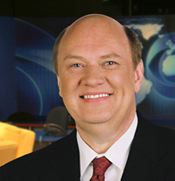 In the last four years, a growing number of boomers — those born between 1946 and 1964 — are showing up in the freshman class of state legislatures. Aspirations for the statehouse reflect a broader trend: Boomers, nearly 3 million of whom will celebrate their 60th birthday this year, are eschewing retirement in favor of meaningful second careers. Nearly 60 percent of Americans aged 50 to 70 said they want to put social purpose ahead of other goals, according to a recent survey commissioned by Civic Ventures, a group promoting older workers. (right: Pennsylvania Rep.-elect Frank Andrews Shimkus (D), former news anchor of WYOU-TV)
In the last four years, a growing number of boomers — those born between 1946 and 1964 — are showing up in the freshman class of state legislatures. Aspirations for the statehouse reflect a broader trend: Boomers, nearly 3 million of whom will celebrate their 60th birthday this year, are eschewing retirement in favor of meaningful second careers. Nearly 60 percent of Americans aged 50 to 70 said they want to put social purpose ahead of other goals, according to a recent survey commissioned by Civic Ventures, a group promoting older workers. (right: Pennsylvania Rep.-elect Frank Andrews Shimkus (D), former news anchor of WYOU-TV)
As evidence, some 20 percent of new teachers in alternative certification programs are over 50, the number of boomers in divinity schools has nearly doubled, and community colleges report a noticeable increase in older entrants in nursing and other health-related fields, said David Bank, senior vice president of Civic Ventures, and co-author of a forthcoming book on boomer retirement entitled “Encore.”
As a group, baby boomers have been more civically engaged than previous generations, and because they are expected to live longer and healthier lives than their parents, late-life political careers are a natural fit, said Jim Emerman, executive vice president of Civic Ventures (
link to PDF of survey).
“They want to use the talents and experience they have to solve big problems in their community and in the country,” he said.
Frank Andrews Shimkus has been in the public eye for three decades. But for the freshman Democratic representative from the 113th District in Scranton, Pa., politics is a second career. Shimkus, 54, is better known as local TV anchor Frank Andrews.
He is one of more than 1,200 new faces in statehouses across the country.
Boomer Legislators
November’s elections ushered in a crop of lawmakers with non-traditional backgrounds: Many are not lawyers and have never before held public office. More women, Hispanics, blacks and Native Americans than in previous years were also part of the mix along with a new political breed — baby boomers who want to make a difference.
For his part, Shimkus said his goal is to make the Pennsylvania Legislature more accountable — a tall order in a state where lawmakers were recently chastised for secretively giving themselves a last-minute pay raise. Not one to shun a challenge, he vows to reduce the size and cost of the Legislature, even if it means eliminating his own job.
To increase his visibility, Shimkus chose a ground-floor office with a plate-glass window on Main Street in Scranton, and he even plans to put his reporting skills to work by holding town-hall-style meetings and speaking directly with as many constituents as possible.
“My staff and I want to personally call at least 30 people every day. Most people have no concept of what a state representative does or should do. I want to bring Harrisburg to the people,” he said.
The decision to run for the Legislature was tough, Shimkus explained, because it meant giving up his career as a journalist. Pennsylvania legislative positions are considered full time, and professional ethics bar journalists from politics.
 |
Nebraska Sen.-elect Annette Dubas and her son
on the farm in Fullerton, Neb. |
Some new boomer legislators, however, plan to keep pursuing their first careers while holding office. A case in point is Annette Dubas, 50, a lifelong farmer and mother of four, who was elected to the Nebraska Statehouse.
Because of term limits, 22 of the 49 seats in Nebraska’s nonpartisan, unicameral Legislature opened up, and Dubas saw the opportunity to follow her political ambition while maintaining her family’s farm.
The decision to run for public office was difficult, she said, because it meant leaving more of the farm work to her family: “We are a family operation. My son and his wife took care of the harvest this fall while my husband and I were out campaigning.”
Even though she has yet to take office, Dubas splits her time between the Nebraska Statehouse, road trips to meet constituents and chores on the farm. “I haven’t even been sworn in yet and I’m going somewhere every day, doing a lot of reading and educating myself,” she said.
Like Shimkus, Dubas wants to be accessible. She plans to set up field offices and drive around her four-county district to meet citizens so they won’t have to travel to the capital.
“There seems to be an intimidation factor. I want people to just call me up and let me know their concerns,” she said.
In Nebraska, taxes and education are always big issues, Dubas said, but for now she plans to concentrate on the state’s severe water shortage. She’ll also work to keep small schools open and maintain the vitality of towns.
 |
|
Nebraska Sen.-elect Greg Adams with volunteer
students from local high schools
|
Another Nebraska boomer, 54-year-old Greg Adams, said he joined the Legislature after 31 years in teaching because he “wasn’t ready to sit down and quit yet.” Adams was somewhat familiar with what he would face in the Statehouse — he has more than two decades of political experience, including a stint as mayor of York, Neb., his hometown.
Adams figures he can combine his classroom experience and political savvy to solve some of the state’s most pressing problems.
“Education has always been important to me. I want to get kids to stay or even come back to the small towns,” he said. He hopes to accomplish this by boosting economic opportunities in the state’s rural communities, he explained.
 |
| Arkansas Rep.-elect Kathy Webb (D) on left, at her restaurant |
Education is also a top priority for Kathy Webb, 57, a freshman Democratic representative in the Arkansas House. Webb — owner of the Little Rock restaurant, Dim Sum Then Some — said she understands what education means for workers: “I have daily interaction with people who can’t read and can’t do percentages. I see the need for something to offer people who are not going to college — more vocational training.”
Voicing a common theme among new state lawmakers, Webb said she will focus on staying in touch with her constituency — something she’s already accustomed to through her interaction with employees and customers at the restaurant.
As boomers nationwide learn the ropes of lawmaking during legislative orientation classes this month, they’ll get a taste of the challenge ahead. The work of a legislator is not rocket science, but it isn’t easy; it takes patience and an ability to digest reams of information, said Bruce Feustel, senior fellow at NCSL. Experience counts for a lot, but like any new legislator, boomers will have to pace themselves to avoid burnout and information overload, he explained.
Are statehouses likely to fulfill baby boomers’ quest for meaningful second careers? “Most legislators choose to run for re-election — that is evidence the job is rewarding,” said Karl Kurtz, a director at NCSL
.
Story originally published by Stateline.org. Contact Christine Vestal at cvestal@stateline.org
 In the last four years, a growing number of boomers — those born between 1946 and 1964 — are showing up in the freshman class of state legislatures. Aspirations for the statehouse reflect a broader trend: Boomers, nearly 3 million of whom will celebrate their 60th birthday this year, are eschewing retirement in favor of meaningful second careers. Nearly 60 percent of Americans aged 50 to 70 said they want to put social purpose ahead of other goals, according to a recent survey commissioned by Civic Ventures, a group promoting older workers. (right: Pennsylvania Rep.-elect Frank Andrews Shimkus (D), former news anchor of WYOU-TV)
In the last four years, a growing number of boomers — those born between 1946 and 1964 — are showing up in the freshman class of state legislatures. Aspirations for the statehouse reflect a broader trend: Boomers, nearly 3 million of whom will celebrate their 60th birthday this year, are eschewing retirement in favor of meaningful second careers. Nearly 60 percent of Americans aged 50 to 70 said they want to put social purpose ahead of other goals, according to a recent survey commissioned by Civic Ventures, a group promoting older workers. (right: Pennsylvania Rep.-elect Frank Andrews Shimkus (D), former news anchor of WYOU-TV)



















